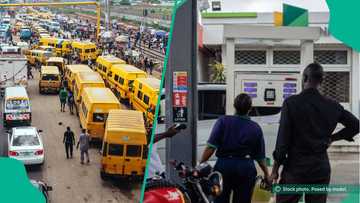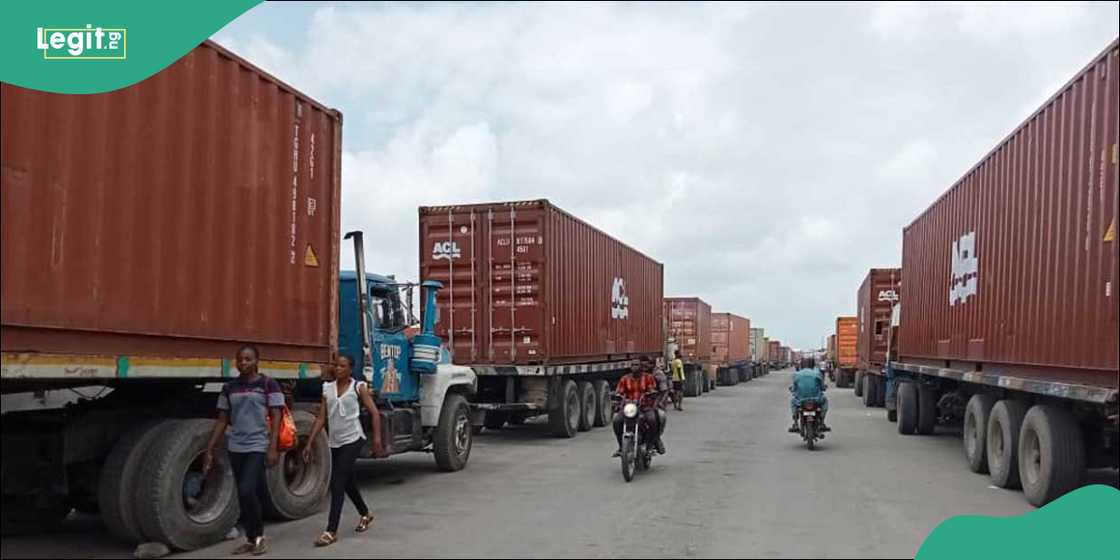Haulage Costs Crash By Over 60% at Apapa, Tin-Can Ports, Operators Give Reasons
- While prices of everything in Nigeria are rising, importers have seen haulage costs crash by more than half in one week
- The truckers and cargo operators have their different ideas about what is responsible for the drop in prices
- The electronic call-up system was introduced at the Apapa and Tin-Can sea ports last year to ease logistics
Legit.ng journalist Ruth Okwumbu-Imafidon has over a decade of experience in business reporting across digital and mainstream media.
It is interesting times for Nigeria, as haulage costs at the Lagos seaports have crashed more than 60% in the last week.
The haulage costs refers to the price spent to move already cleared containers out from the port to the destination, and is different from the import and clearing duties.
Truckers confirmed that the price of a haulage trip from Apapa seaport to Sango Otta, Ogun State, tanked massively from N900,000 last week to about N350,000 this week.

Read also
Nigerians expect cheaper fuel as landing cost drops again, lower than that of Dangote Refinery

Source: Getty Images
The cost of haulage from the seaport to Ikeja also cost around N650,000 to N750,000 last week for a trip, but is now in the range of N250,000.
A trip from the port to Agege also cost about N600,000 to N650,000 before, but now costs N200,000.
Operators share reasons behind the price drop
One trucker, Yusuf Liadi told Leadership News that the price drop was a result of several factors starting with low imports.
Liadi stated that due to the unfavourable exchange rate and high clearing costs, volume of imports had reduced drastically, also reducing the demand for the haulage trucks.
According to him, several trucks are in the yards waiting to get a Terminal Delivery Order (TDO) to move cleared cargoes to the warehouses, and this created a supply-demand imbalance that cause prices to crash.
The presence of a viable standard gauge rail line now also means that many importers are opting to move their cargoes out of the seaports to Oyingbo or Sango Otta.
Liadi expressed his concerns over the current price which he said is not a true reflection of Nigeria’s economic reality, and hoped it would increase again.
Cargo operators credit it to the e-call system
Chairman of the Lagos State Truck and Cargo Operators Committee (LASTCOC), Alhaji Lukman Shittu, attributed the price drop to the efficiency of the electronic call-up system now.
With the e-callup system, it is easier to make bookings, and the port access roads are free reducing the time spent in haulage and translating into the reduced prices.
He explained;
“When there is a scarcity of trucks at the terminals, we have a few trucks chasing so many already cleared cargoes, the price will go up. Also, when there is congestion on the port access roads, prices will automatically go up.”
Shittu debunked talks of low imports, insisting that up to 100 trucks haul cargoes out of the ports daily.
Another trucker, Alhaji Alaba Asobiaro, corroborated his statement, noting that the price drop is due to the absence of congestion on the port roads, as supported by the e-call-up system.

Source: UGC
He noted that if the ease of booking and accessing the ports remain as is now, he expected the prices to stay low.
Recall that investors pulled out of the Lekki-Epe ports corridor due to the suspension of the electronic call-up.
Truck drivers identify cartel opposing e-callup system
In related news, Legit.ng reported that the members of the Trucks Transit Park (TTP) had identified a cabal opposing the implementation of the e-call-up system.
The government had introduced an electronic call-up system at the ports to enhance truck logistics and ease movement in those corridors.
The cartel, made up of private and public workers, however, preferred the old system where they exploited truck drivers, and so tried to frustrate the e-call-up.
PAY ATTENTION: Сheck out news that is picked exactly for YOU ➡️ find the “Recommended for you” block on the home page and enjoy!
Source: Legit.ng




